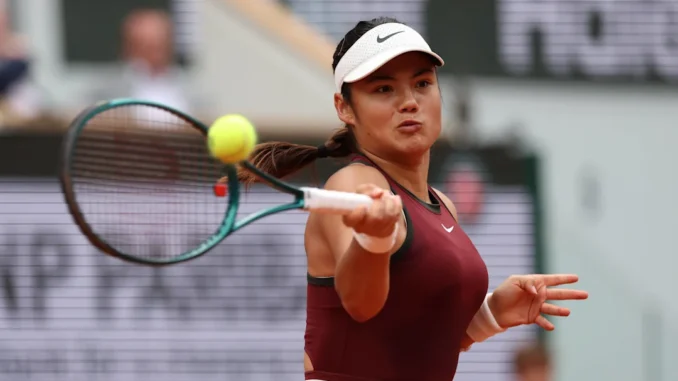
In a disheartening turn at the 2025 French Open, Emma Raducanu faced a formidable challenge against defending champion Iga Swiatek, resulting in a swift 6-1, 6-2 defeat in the second round. The match, which unfolded on the clay courts of Roland Garros, highlighted the ongoing difficulties the young British star has encountered since her meteoric rise in 2021. Her coach, Mark Petchey, has pointed to an unexpected culprit for her struggles: the weight of modern tennis balls, which he claims have become significantly heavier in recent years, posing a unique challenge for players like Raducanu who rely on finesse rather than brute power.
Raducanu, still only 22, burst onto the global stage with her stunning 2021 US Open victory, becoming the first qualifier to claim a Grand Slam title. The triumph, achieved at just 18, set sky-high expectations, but her journey since has been fraught with challenges, including a revolving door of coaches and persistent injuries. Her current season record stands at 13-11, reflecting a battle to regain the form that once made her a household name. The recent loss to Swiatek, a player who has now defeated Raducanu convincingly in both the 2025 French Open and the Australian Open earlier this year (6-1, 6-0), underscores the gap between the Briton and the sport’s elite.
Petchey, a former British number one and a seasoned coach who once guided a young Andy Murray, has been working with Raducanu in an informal capacity since March. He argues that the heavier tennis balls used in recent tournaments, particularly on the slow, demanding clay courts, have hindered Raducanu’s performance. “The balls are four times heavier than back in 2021, and Emma isn’t the biggest hitter out there,” Petchey said, exaggerating to emphasize the point. “If you can’t put the ball through the court on a windy, heavy clay court day against someone like Iga, you’re going to get into all sorts of trouble.” His comments echo a broader sentiment in the tennis community, with players like Stan Wawrinka and Nick Kyrgios also voicing concerns about the impact of heavier balls on play and injury risk.
The French Open defeat was not without its off-court drama. Observers noted a tense moment at the net, where Raducanu’s handshake with Swiatek was described as “cold” and “dismissive” by former player Annabel Croft. This perception added fuel to discussions about Raducanu’s mental and emotional state under pressure. Yet, Petchey remains steadfast in his defense of his protégé, emphasizing the daunting challenge posed by Swiatek, who boasts a 23-match winning streak at Roland Garros. “On this court, Iga has 23 straight wins. You don’t put those streaks together at a major if your game isn’t so difficult to play against,” he said. “It was clearly going to be the ultimate test for Emma.”
Despite the setback, Raducanu’s recent performances show signs of progress. Her victory over Wang Xinyu in the first round of the French Open, despite battling illness, was a testament to her resilience. Earlier this month, she displayed flashes of brilliance at the Internationaux de Strasbourg, defeating former world No. 8 Daria Kasatkina with a blend of powerful groundstrokes and tactical variety. That win, part of a promising clay-court campaign, marked her growing comfort on a surface that has historically challenged British players. Her run at the Italian Open, where she reached the last 16 before falling to Coco Gauff, further bolstered her confidence, with Raducanu noting, “I take good confidence from this. I played really good tennis, and I came through some really tough opponents.”
As Raducanu prepares to transition to the grass-court season, where she has historically excelled, there is optimism about her prospects. She is slated to compete at the Eastbourne Open, an event where she reached the quarter-finals last year, and will aim to carry momentum into Wimbledon. Petchey, who will continue coaching her through the grass season, believes she needs two more years to fully develop her all-round game. Former world No. 1 Caroline Wozniacki also weighed in, suggesting that Raducanu’s unconventional path—winning a Grand Slam so early in her career—has complicated her development. “The fact that Emma has won a Grand Slam, that was kind of her first burst on the scene, is very unusual,” Wozniacki noted.
Off the court, Raducanu has faced additional challenges, including a back injury that required acupuncture treatment before the French Open and the loss of several sponsorship deals, leaving her with eight remaining partnerships. Yet, her focus remains on rediscovering her love for the game and stimulating her mind beyond tennis, with plans to resume studies in subjects like English, politics, or physics. “I need something to stimulate and engage my brain so my entire life isn’t just tennis,” she recently shared.
As Raducanu looks ahead, the narrative around her is one of resilience and potential. While the weight of tennis balls may be a factor, her journey is about adapting to the sport’s evolving demands and carving out a sustainable path back to the top. With the grass courts of Wimbledon on the horizon, fans and analysts alike are eager to see if Raducanu can recapture the magic of 2021 and silence the doubters.
Leave a Reply